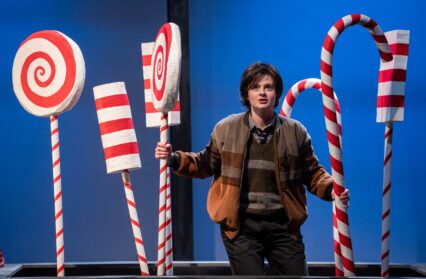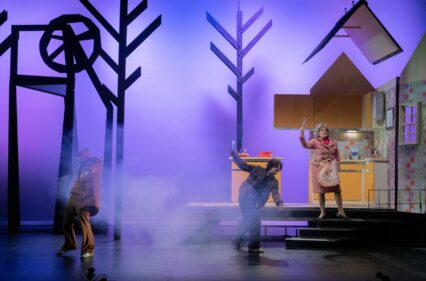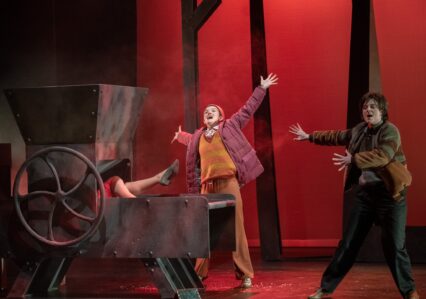Mid Wales Opera are touring with their first stab at a work that has long held its place in the repertory. Nigel Jarrett was at Theatr Brycheiniog to find out what they made of Hänsel and Gretel.
Margaret Thatcher’s image as an ogre is resurrected in Mid Wales Opera’s new production of Hänsel and Gretel by Engelbert Humperdinck, who turned thirty a year after the death of Wagner in 1883. Director-designer Richard Studer plays with both of these facts in a wittily crafted production.
Thirty was the age at which Humperdinck and his composer pals throughout Europe had become almost slavish Wagnerians. It was also the period of time in years between the introduction of free school milk for UK school kids and the policy’s demolition by Cabinet member Thatcher, the proverbial and notorious ‘milk snatcher’.
Not lost on Studer, one might guess, was that warbling into the hit parade during the Thatcher years, before she became Prime Minister, was Humperdinck’s namesake, and that one of the later Humperdinck’s successes, in 1970, was the song Love Me With All Of Your Heart. Love battles with deprivation and cruelty in Hänsel and Gretel, the Brothers Grimm’s folk-tale on which the opera is not so much based as made musical.
Studer’s location is a mining village and the father (Philip Smith) presumably a pit worker. This is not the industrial unrest of the 1980s but may be a premonition of soon-to-be inaugurated Thatcherdom, in which greed would be a virtue and neighbourliness a factor in survival. Miner militancy had been growing. A neighbour supplies cream for the family to have rice pudding but the brother and sister are not so much malnourished as just hungry (Charlotte Badham is Hänsel, Alys Mererid Roberts is Gretel), and can’t resist tasting it. They mooch about, dance, read Jackie magazine, and watch telly; but telly-snatching bailiffs arrive to close off that avenue of pleasure. Something’s going on, possibly to do with the old man’s drinking habits.
This, of course, is a production tailored for touring to smaller theatres; it’s MWO’s raison d’etre. But instead of a tiny group of musicians at the side of the stage, the orchestra pit is this time occupied by the larger Ensemble Cymru, MWO’s creative partner, performing a score nonetheless reduced by MWO’s musical director and conductor Jonathan Lyness. The variation is more subtle than that. In the same way that Philip Glass’s minimalism is asked to bear heavy operatic loads, the Grimms’s light (though bleak and macabre) fantasy was originally set to music that’s everywhere influenced by Wagner, a composer not known for thinking small, either in the orchestra or elsewhere. As in other of their touring productions, MWO get these balances spot on. From the introductory Vorspiel to the final hymn of thanks, the music is bewitching. Lyness’s changes are the result of battle done with the original score’s counterpointing polyphony; he has secured the work’s big musical moments, from the enchanting woodland scenes to the Knusperwalzer dance of the two young protagonists, and at the same time eased the task of the orchestra’s members.
Studer’s set has a shed stage right which at first is the father’s bolt-hole but later opens up into the Witch’s cottage and gingerbread-making kitchen, very 1970s and complete with a cupboard door pin-up picture of Winston Churchill. Rebecca Afonwy-Jones’s Witch (she also doubles as the desperate Mother) is as close a Thatcher simulacrum as it gets, gamely tumbling backwards and head first into the grotesque mincing-machine stage left, which resembles something hired from Plant Rental plc’s Mordor branch. Studer’s set consists of a skeletal home, a louring and formalised pit winding-wheel, and trees made of RSJ-type strips lowered from the fly tower. You don’t need much when a lot of the horror is in the mind. What the lost duo does need are a protecting Sandman (Beca Davies/Siân Roberts), a Dew Fairy (Roberts) and a chorus including H & G coevals (Davies, Roberts, Erin Fflur, Rachel Morás, and the following additions from the local branch of Ghost Light Performers: Layla Dodge, Daisy Edmonds, Nansi Jones, and Ruby Short, with their coaches Roisin Mellerick and Sarah Isaac). Metaphoric darkness needs literal illumination and lighting designer Elanor Higgins supplies it at strategic moments, especially when the guardians protecting and peopling the dream of Hänsel and Gretel wear coalminer helmets with lamps, and that mincer is readied for action.
The singing is a delight, in both its adult and teenage manifestations, and the final chorus is co-operatively heartfelt and moving. Lyness conducts the orchestra with the kind of aplomb essential for a story that is both in the mind and in the flesh, and both bleak and, finally, triumphant. By the end, the Thatcher reference, however valid as a transposition, has come to seem casual and indirect, a reminder only of an instance in time when children were victims of adult meanness. By all accounts, there were no deleterious health affects of ‘snatching’ milk from kids; the country saved a lot of money, which was the point of Thatcher’s exercise. Reality is different from appearance, however, and in this case the folk-tale is skewed by surreality involving a controversial political figure mercilessly satirised as a victim of her own machinations. Yesterdays’ woman, in more than one sense.
Further tour dates: Aberystwyth, Arts Centre (March 14), Milford Haven, Torch Theatre (March 16), Hereford, Courtyard (March 18), Llanelli, Ffwrnes (March 21), Newport, Gwent, Riverfront (March 23). Ticket information available from Mid Wales Opera.
Nigel Jarrett is a regular contributor to Wales Arts Review. He won the Rhys Davies Prize and the Templar Shorts Award, both for short fiction. His sixth book, a fictional memoir, is Notes From the Superhorse Stable; it appeared last summer from Saron Publishers. His fourth story collection, Five Go to Switzerland, was published in November 2023 by Cockatrice Books.





 Enjoyed this article? Support our writers directly by buying them a coffee and clicking this link.
Enjoyed this article? Support our writers directly by buying them a coffee and clicking this link.








